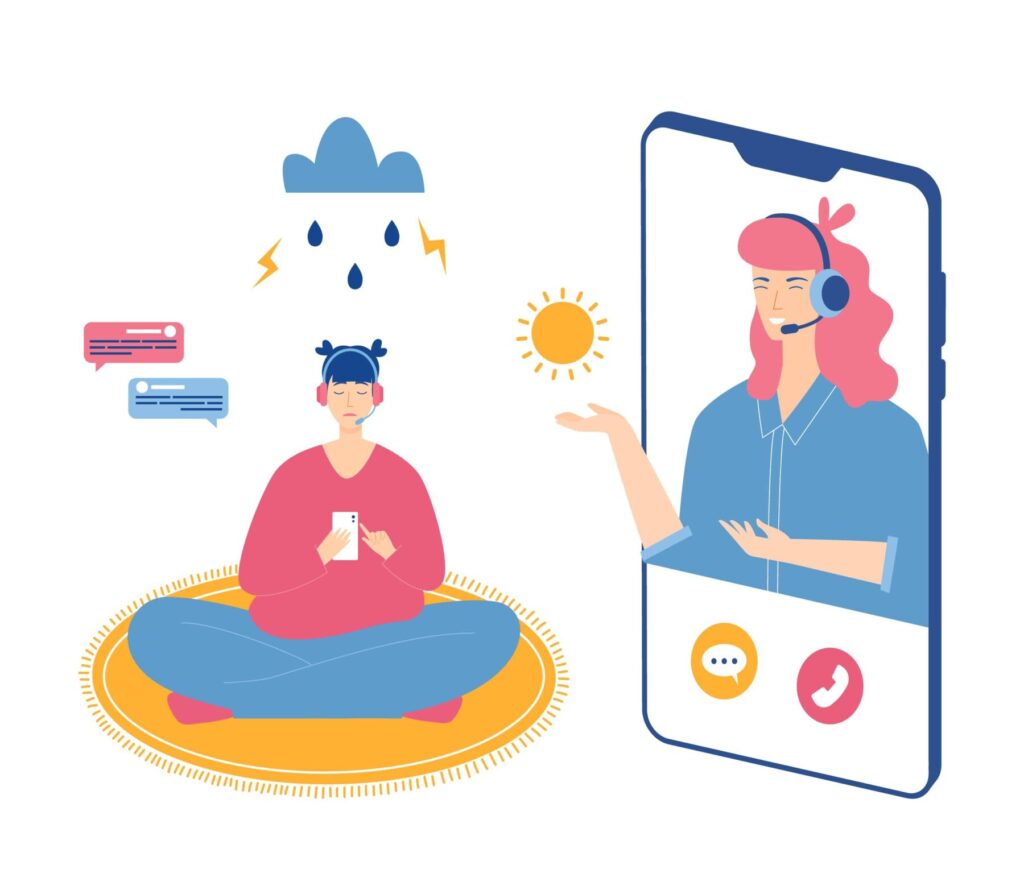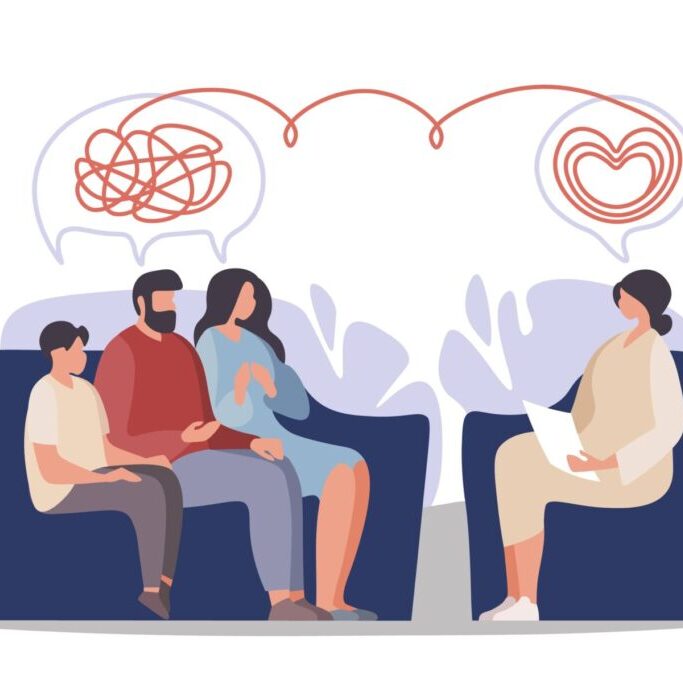The Benefits of Teletherapy: Why It’s a Game-Changer for Mental Health

Have you ever wondered if there’s an easier, more flexible way to manage your mental health? Or maybe you’re an LGBT person in rural Illinois that doesn’t have LGBT affirming therapists close? Or maybe you work in Chicago, but need to fit therapy in between your work meetings? If so, you’re not alone.
As the demand for accessible mental health services rises, more people are turning to teletherapy, a modern approach that brings therapy right to your fingertips. Gone are the days when therapy was confined to a therapist’s office; today, you can receive professional support from the comfort of your home or any location that suits you. This shift isn’t just about convenience—it’s a revolution in mental health care.
Virtual mental health therapy has emerged as a powerful tool for breaking down barriers, addressing mental health challenges, and making therapy more inclusive. But what exactly makes teletherapy so beneficial, and why is it becoming a popular choice for so many people? Let’s explore the benefits of telehealth therapy and why it’s truly a game-changer for mental well-being.
What is Teletherapy?
Teletherapy, also known as online or virtual mental health therapy, is the practice of delivering therapy services through digital communication tools such as video calls or phone calls.
While the concept existed before 2020, the COVID-19 pandemic accelerated its widespread adoption. (In fact, Illinois passed legislation shortly after the pandemic started requiring telehealth services to be covered by insurance companies at the same level as in-person therapy.)
Teletherapy offers a unique blend of accessibility, flexibility, and cost-effectiveness, making mental health support easier to obtain than ever before. But beyond these factors, teletherapy has other compelling benefits worth exploring.
Why Teletherapy is a Game-Changer for Mental Health
- Eliminates Geographical Barriers – One of the biggest hurdles to in-person therapy is geography. Many people living in rural Illinois or underserved areas of Chicago struggle to access mental health care due to the lack of nearby professionals. Teletherapy changes that by connecting people with qualified therapists regardless of location. With a stable internet connection, you can attend therapy sessions from anywhere—no more lengthy commutes or waiting lists.
Statistic to Know: A 2020 study in the Journal of Medical Internet Research found that telehealth services increase access to mental health care by 30% in rural areas, significantly bridging the treatment gap (Furber et al., 2020). - Convenience and Flexibility – Have a busy schedule? Teletherapy makes it easier to integrate therapy into your routine without disrupting work or personal commitments. Sessions can be scheduled around your availability, whether it’s during lunch breaks, evenings, or weekends.
You can even attend therapy from the comfort of your living room or a quiet corner of your office. This convenience not only reduces logistical challenges but also encourages consistency in attending sessions.
Frequently Asked Question: Can teletherapy fit into my busy life?
Yes! With flexible scheduling and the ability to attend sessions from anywhere, teletherapy is designed to fit seamlessly into your daily routine. - Offers a Wide Range of Modalities and Specializations – Unlike traditional in-person therapy, where options might be limited based on your location, virtual mental health therapy provides access to a broader spectrum of therapeutic modalities and specializations.
Whether you’re interested in Cognitive Behavioral Therapy (CBT), Internal Family Systems Therapy (IFS), or even relational therapy, teletherapy platforms cater to diverse needs. Additionally, specialized services like trauma-informed care, LGBTQ+ affirming therapy, and neurodivergent sensitive therapy are often easier to find online. - Enhances Privacy and Confidentiality – Many people are hesitant to seek therapy due to privacy concerns—after all, visiting a local therapist’s office can feel daunting or potentially expose you to unwanted attention.
Teletherapy platforms use robust encryption and privacy protocols to ensure your information remains confidential, giving you peace of mind as you engage in therapy. With the added layer of conducting therapy from your private space, you can feel more at ease, increasing the likelihood of open and honest communication.
Frequently Asked Question: Is teletherapy secure?
Yes, most teletherapy platforms are HIPAA-compliant and use strong encryption to ensure that your personal information and sessions remain confidential. - Cost-Effectiveness – While the cost of therapy can be a significant concern, teletherapy often reduces associated costs like ride-share prices, reduced need for childcare, or missed billable hours. In Illinois, HB 3308 is a law that requires that your insurance cover telehealth therapy with the same coverage as in-person therapy.
Statistic to Know: According to a 2021 report by the American Psychological Association, 60% of online therapy users reported cost savings compared to in-person therapy, making it a more budget-friendly choice (APA, 2021). - Improved Accessibility for Diverse Populations – Teletherapy has proven especially beneficial for those who may find traditional therapy settings challenging. People with physical disabilities, social anxiety, or agoraphobia can access therapy without facing the difficulties of travel or public spaces.
The convenience of virtual mental health therapy also makes it more feasible for caregivers, parents, or those managing chronic conditions to receive regular mental health care. People with diverse identities (queer/LGBT, racial minorities, religious minorities, etc.) can access specialists without huge or impossible commutes. - Maintains Consistent Care in Emergencies – The COVID-19 pandemic demonstrated the importance of teletherapy in maintaining continuous care during global crises. Whether due to a public health emergency, severe weather, or personal mobility issues, teletherapy ensures that therapy is always within reach.
Frequently Asked Question: Will teletherapy be effective during a crisis?
Yes, teletherapy has proven effective in maintaining mental health care continuity, especially during times when in-person sessions are not possible.
Make Teletherapy Work for You
The benefits of telehealth therapy are clear—greater accessibility, convenience, affordability, and specialized care make it a powerful tool for improving mental well-being. If you’re seeking a flexible, reliable way to support your mental health, virtual mental health therapy could be the right fit. Don’t wait to take the next step in prioritizing your mental wellness.
Ready to experience the benefits of teletherapy firsthand?
Tandem Psychology offers compassionate, personalized virtual mental health therapy tailored to your unique needs. Whether you’re seeking support for anxiety, depression, stress, LGBT issues, or life transitions, our experienced therapists are here to help.
Don’t wait—reach out to Tandem Psychology today to schedule your first teletherapy session and start your journey towards better mental well-being from the comfort of your home. Contact us now!
This blog is made for informational and educational purposes only. It is not medical advice. The information in this blog is not intended to (1) replace a one-on-one relationship with a qualified licensed health care provider, (2) create or establish a provider-patient relationship, or (3) create a duty for us to follow up with you.



